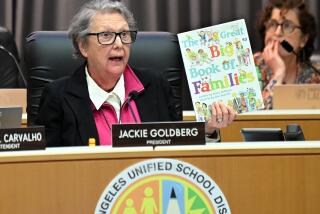Carnegie Education Forum Plans National Board to Certify Teachers
- Share via
CORONADO — The Carnegie Forum on Education and the Economy announced Friday the establishment of a national board that will set standards and assess and certify the competence of teachers.
The forum’s announcement, made during its second annual meeting attended by teacher leaders, legislators and state and local education officials, came one year after its release of a provocative report that urged a radical overhaul of the teaching profession.
Former North Carolina Gov. James B. Hunt Jr., chairman of a planning committee appointed by the forum last fall, said the board will have a maximum of 63 members. Members will include teachers, governors, legislators, top state education officers, local school board members, parents and business leaders.
But the majority of the board will consist of regular classroom teachers, a requirement that delighted leaders of the nation’s two major teacher unions.
Minor Teacher Role Feared
The National Education Assn. and the American Federation of Teachers, which together have more than 3 million members, for years had opposed the concept of a board because they feared teachers would not be allowed a major role in establishing and maintaining the standards for their profession. Both organizations broke from their traditional positions when they endorsed the Carnegie proposal at separate conventions last year.
The Carnegie Forum, established by the Carnegie Corp., a New York philanthropic foundation, is a blue-ribbon task force composed of top education, business and government leaders that has been in the forefront of several key educational reform movements in the past.
The report it issued last year outlined in broad fashion a strategy for substantially improving the quality of teaching. Friday’s announcement of plans for the national certification board represented a substantial step toward implementing that strategy. What distinguishes the campaign from other educational reform efforts is that the Carnegie Forum has garnered broad political support and has Carnegie Corp. money to back it up.
The forum already has pledged $817,000 to fund the board. Carnegie forum Chairman David A. Hamburg said Friday that he plans to recommend to the Carnegie Corp. board that it commit $5 million over the next five years in support of the board’s work, but he added that ‘multi-millions’ more will be sought from other foundations and institutions. Carnegie officials estimated that it may cost $50 million over the next 10 years to fully implement the ideas contained in the forum’s report.
Interim Board
According to Hunt, 29 of the 33 members of the planning committee have agreed to serve as an interim board. The remaining seats will be filled and a president chosen sometime this summer.
The major work ahead for the board is to tackle the problem of how to gauge the knowledge and ability of teachers.
A Stanford University research team has already begun to devise sample exercises that can be used in a national board test. Such exercises might include asking teachers to critique a textbook, grade papers or evaluate a videotape of themselves teaching a lesson.
The goal is to develop testing methods that will be more comprehensive than the pencil-and-paper examinations currently used by many states to determine minimum teacher competence. Such tests are widely judged to be inadequate, in large part because they do not allow for demonstrations of teachers’ skills.
Cooperative Effort
Underscoring the need to create better assessment tools, the state schools chiefs for California and Connecticut used the occasion of the Carnegie meeting to announce a cooperative effort to develop more creative tests that states can use to judge teachers’ qualifications for licensing. The project will be funded by a $50,000 grant from the National Governors Assn.
“All we really have now is NTE (the National Teacher Examination’s professional knowledge test), which all of us think is too weak,” California schools chief Bill Honig said during a press conference. Research teams will focus on developing more creative testing methods, such as structured interview situations, to determine a teacher’s knowledge of subject matter as well as his or her effectiveness in the classroom.
National board certification would be voluntary for teachers and would not take the place of state licensing. But Carnegie officials hope that school boards will seek out certified teachers and perhaps pay them higher salaries than teachers who are not board-certified.
Devising better assessment tools is a complex and expensive undertaking, and thus it will be several years before the board will begin to issue certificates, Carnegie officials said.
Hamburg, however, stated that he expects the board to become a permanent and major institution that will significantly improve the quality of American public education.
Participants in the Carnegie meeting described the national board as an exciting step forward in educational reform, but some cautioned that its prospects for success are uncertain.
“It’s a visionary and risky undertaking,” said Patrick Callan, director of the Education Commission of the States, a research-oriented group that helps states develop policies to improve the quality of education. “Fruition is several years down the line . . . and the challenge is to sustain interest in the board around the country.”
More to Read
Sign up for Essential California
The most important California stories and recommendations in your inbox every morning.
You may occasionally receive promotional content from the Los Angeles Times.














